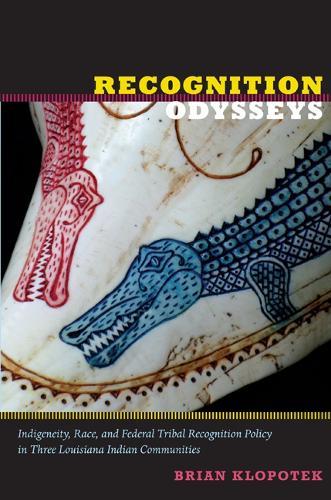Overview
In Recognition Odysseys, Brian Klopotek explores the complicated relationship between federal tribal recognition policy and American Indian racial and tribal identities. He does so by comparing the experiences of three central Louisiana tribes that have petitioned for federal acknowledgment: the Tunica-Biloxi Tribe (recognized in 1981), the Jena Band of Choctaws (recognized in 1995), and the Clifton-Choctaws (currently seeking recognition). Though recognition has acquired a transformational aura, seemingly able to lift tribes from poverty and cultural decay to wealth and revitalization, these three cases reveal a more complex reality.Klopotek describes the varied effects of the recognition process on the social and political structures, community cohesion, cultural revitalization projects, identity, and economic health of each tribe. He emphasizes that recognition policy is not the only racial project affecting Louisiana tribes. For the Tunica-Biloxis, the Jena Band of Choctaws, and the Clifton-Choctaws, discourses around blackness and whiteness have shaped the boundaries of Indian identity in ways that have only begun to be explored. Klopotek urges scholars and officials from the Bureau of Indian Affairs (BIA) to acknowledge the multiple discourses and viewpoints influencing tribal identities. At the same time, he puts tribal recognition in broader perspective. Indigenous struggles began long before the BIA existed, and they will continue long after it renders any particular recognition decision.
Full Product Details
Author: Brian Klopotek ,
K Tsianina Lomawaima ,
Florencia E Mallon ,
Alcida Rita Ramos
Publisher: Duke University Press
Imprint: Duke University Press
Dimensions:
Width: 16.00cm
, Height: 3.30cm
, Length: 23.60cm
Weight: 0.699kg
ISBN: 9780822349693
ISBN 10: 0822349698
Pages: 277
Publication Date: 30 March 2011
Audience:
College/higher education
,
Postgraduate, Research & Scholarly
Format: Hardback
Publisher's Status: Active
Availability: In Print

This item will be ordered in for you from one of our suppliers. Upon receipt, we will promptly dispatch it out to you. For in store availability, please contact us.
Reviews
Engaging, lively, and based on superior scholarship, Recognition Odysseys is an important contribution to scholarship on the federal recognition process and the broader issue of how U.S. American Indians take on modern political and cultural identities. Brian Klopotek is clearly committed not only to the well-being of the communities he writes about, but also to confronting troubling truths about what it means for tribal peoples to participate in the world of recognition and federal Indian policy. Robert Warrior, Founding President of the Native American and Indigenous Studies Association Recognition Odysseys could quickly become the gold-standard work on how the federal recognition process affects Native Americans. Brian Klopotek deals with the acknowledgment struggles and economic development histories of three tribal groups in Louisiana, a 'hot' area in recent recognition battles. Using his well-chosen case studies, he highlights the importance of race to the three groups' trajectories. Recognition Odysseys suggests that Native American studies must be more attentive to race, and American studies and ethnic studies must engage more actively with indigenous studies. Jace Weaver, author of Other Worlds: American Indian Literature, Law, and Culture Carefully researched and impeccably argued, Recognition Odysseys illuminates the struggles, benefits, and pitfalls of federal recognition for American Indian tribes. Brian Klopotek bravely details the unrecognized history of anti-black racism in the agencies with power to confer federal recognition, and within the tribes themselves. Recognition Odysseys is a necessary book for American Indian studies, as well as for critical race scholars, tribes seeking recognition, and other peoples, such as Native Hawaiians, who are subject to similar processes. oNoenoe K. Silva, author of Aloha Betrayed: Native Hawaiian Resistance to American Colonialism
“Engaging, lively, and based on superior scholarship, Recognition Odysseys is an important contribution to scholarship on the federal recognition process and the broader issue of how U.S. American Indians take on modern political and cultural identities. Brian Klopotek is clearly committed not only to the well-being of the communities he writes about, but also to confronting troubling truths about what it means for tribal peoples to participate in the world of recognition and federal Indian policy.”—Robert Warrior, Founding President of the Native American and Indigenous Studies Association
Engaging, lively, and based on superior scholarship, Recognition Odysseys is an important contribution to scholarship on the federal recognition process and the broader issue of how U.S. American Indians take on modern political and cultural identities. Brian Klopotek is clearly committed not only to the well-being of the communities he writes about, but also to confronting troubling truths about what it means for tribal peoples to participate in the world of recognition and federal Indian policy. Robert Warrior, Founding President of the Native American and Indigenous Studies Association Recognition Odysseys could quickly become the gold-standard work on how the federal recognition process affects Native Americans. Brian Klopotek deals with the acknowledgment struggles and economic development histories of three tribal groups in Louisiana, a 'hot' area in recent recognition battles. Using his well-chosen case studies, he highlights the importance of race to the three groups' trajectories. Recognition Odysseys suggests that Native American studies must be more attentive to race, and American studies and ethnic studies must engage more actively with indigenous studies. Jace Weaver, author of Other Worlds: American Indian Literature, Law, and Culture
Author Information
Brian Klopotek is Associate Professor of Ethnic Studies at the University of Oregon.




